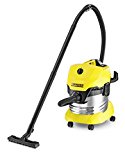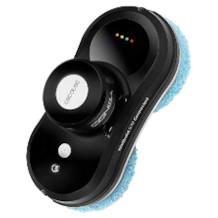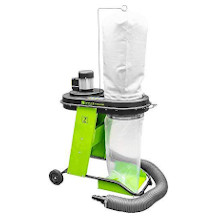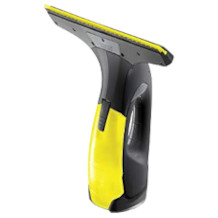Pressure washer purchasing advice: how to choose the right product
- What you need to know
- Pressure washers remove dirt faster and more effectively than normal cleaning methods.
- The most important specs on a pressure washer are water pressure, flow rate, and motor power.
- You can get either petrol or electric pressure washers. Most home devices are electric.
- Pressure washers don’t use any chemicals.
- Using high pressure water can be dangerous, so be careful and follow the safety guidelines.
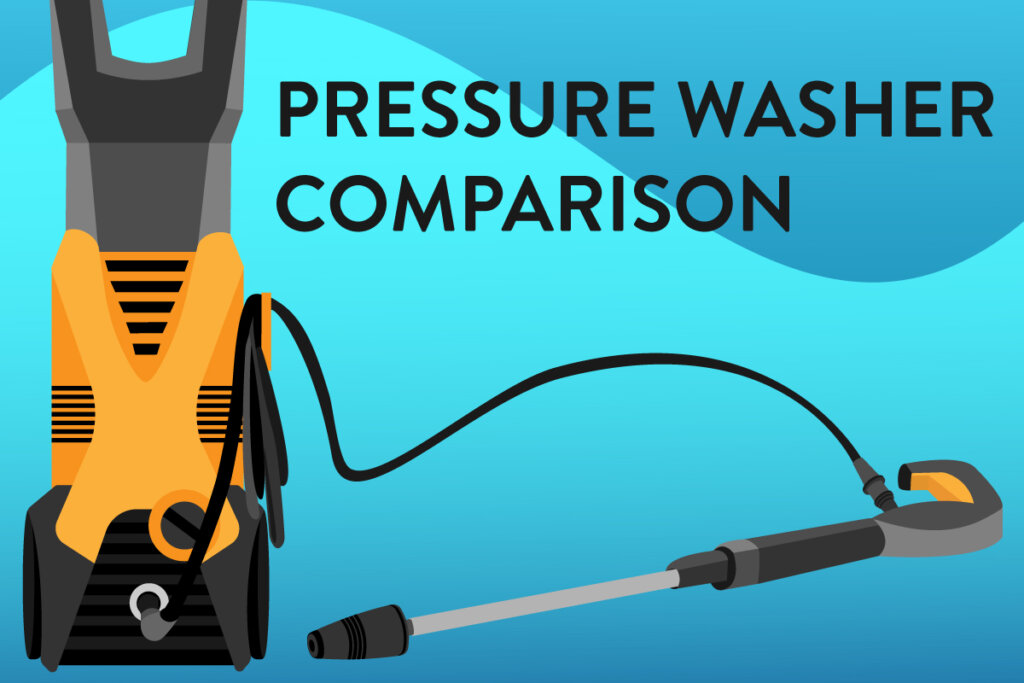
The power of water
Pressure washers produce a jet of high pressure water which makes it easy to remove stubborn dirt. They work on the same principle as garden hoses, except they produce much more pressure. The jet coming from a garden hose is about 60 pounds per square inch (psi). By comparison, pressure washers produce around 1450 psi. The high pressure makes it possible to deep clean extremely tough dirt, far more than with a garden hose.
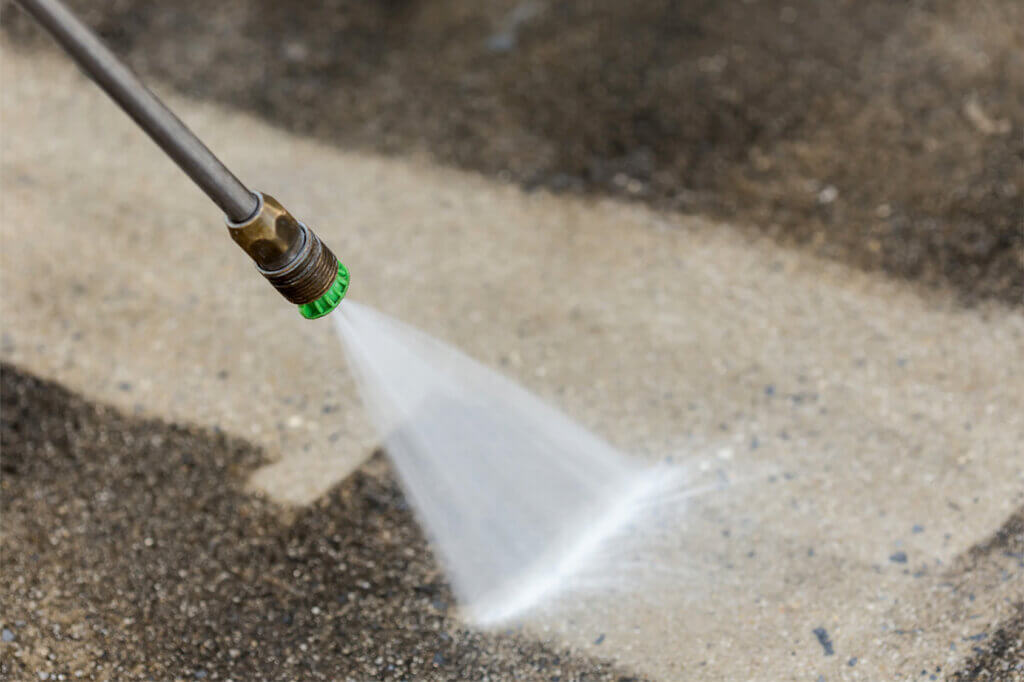
Pressure washers can be used to make your moss-covered patio look like new. They are also a great option for cleaning cars. You can even get oil and grease off with no trouble at all — no need to laboriously scrub your vehicle. Pressure washers are also a good option if you need to clean a large area like a driveway quickly. One big advantage of pressure washers is that you don’t need to use any chemicals as the pressurized water is powerful enough. This means they’re an eco-friendly option as they don’t release any pollutants.
Be safe
Don’t underestimate the power of a pressure washer. Never point the jet at people or animals. It can seriously injure them. Likewise, watch out for sensitive surfaces and plants when using one.
The following list gives a broad introduction to the kinds of things you can clean with a pressure washer:
- Patio floors
- Driveways
- Stone slabs
- Facades
- Gutters
- Garden fences
- Barbeques
- Garden tools
- Garden furniture
- Cars
- Bicycles
- Motorbikes
- Boats
Types of pressure washers
On pressure washers, the water jet comes out of a nozzle. This nozzle is at the end of a metal rod known as a lance instead of being directly attached to the hose. This makes it safer to use. Pressure washers can be broadly categorized by the way in which they are powered: petrol/diesel and electric. Some models can also heat water up to boiling point, to improve their cleaning power.
Electricity vs petrol
Pressure washers have a motor to pressurize the water they shoot out. Most home devices have electric motors. Diesel and petrol pressure washers are more powerful, but they are louder, heaver, and considerably more expensive. They are mainly used by professionals — you won’t need the same power output for home use.
Fuel-powered pressure washers don’t need to be plugged in, whereas electric ones need a mains connection. Needing to plug a pressure washer in can be a bit cumbersome, especially if you need to use an extension cable as well. Since pressure washers need a water connection, you can end up with a lot of tangled cords. Fortunately, there are also battery-powered pressure washers on the market, which can help with this problem
Battery pressure washers
Battery-powered pressure washers are a good option if you aren’t close to a mains connection. The flipside is that they have a limited run time, usually around 20 minutes. In order to save power, they are also usually less powerful than petrol/diesel and cabled models. Typically, the maximum pressure is around 1450 psi on battery-powered pressure washers.
Advantages
- Don’t need to be plugged in
- Some models also have a water tank
Disadvantages
- Limited running time
- Lower water pressure
- Weaker motors
Hot water pressure washers
Hot pressure washers shoot water and steam for even more powerful cleaning than standard models. The heat also kills bacteria and other germs. These pressure washers aren’t common for household use, as most people don’t need the extra power. They are more expensive to buy than normal pressure washers, and have higher running costs.
Advantages
- Dissolves dirt better than cold water
- Kills germs
Disadvantages
- Expensive
- Higher operating costs
- Risk of burns
Buying tips
When choosing a pressure washer, you need to consider what you are going to be using it for. There’s no point in buying a model more powerful than you need. This said, there’s also no point in saving money if the model you buy isn’t strong enough.
Area
If you only need to clean a small area, then you should go for a cheaper, less powerful pressure washer. Battery-powered devices are a good option for cleaning things like your car or balcony. If you are looking to clean a larger area such as your driveway, then look for higher powered pressure washers. Too weak, and cleaning will take ages. Corded pressure washers are a good option for this. For extremely large areas, such as entire houses, go for a diesel or petrol powered pressure washer.
How much pressure do you need?
The higher the pressure, the faster and more powerful the pressure washer. Normal water pipes have a pressure of around 60 psi. Entry-level pressure washers operate at between 1450 and 2000 psi. This said, you can get battery-powered pressure washers that have a low setting of around 300 psi -— these are known as medium pressure washers. They are good as they use less electricity and can therefore run for longer. The gentle pressure is good for cleaning sensitive surfaces. Top-end pressure washers can produce up to 3000 psi.
Flow rate
Flow rate is another important spec to consider when choosing a pressure washer. It is measured in gallons per minute (GPM). The higher the flow rate, the more efficient the pressure washer. Even if you have high pressure, if you don’t have a high enough flow rate, you won’t be able to clean very well. Go for a pressure washer with a flow rate of at least 2.2 GPM.
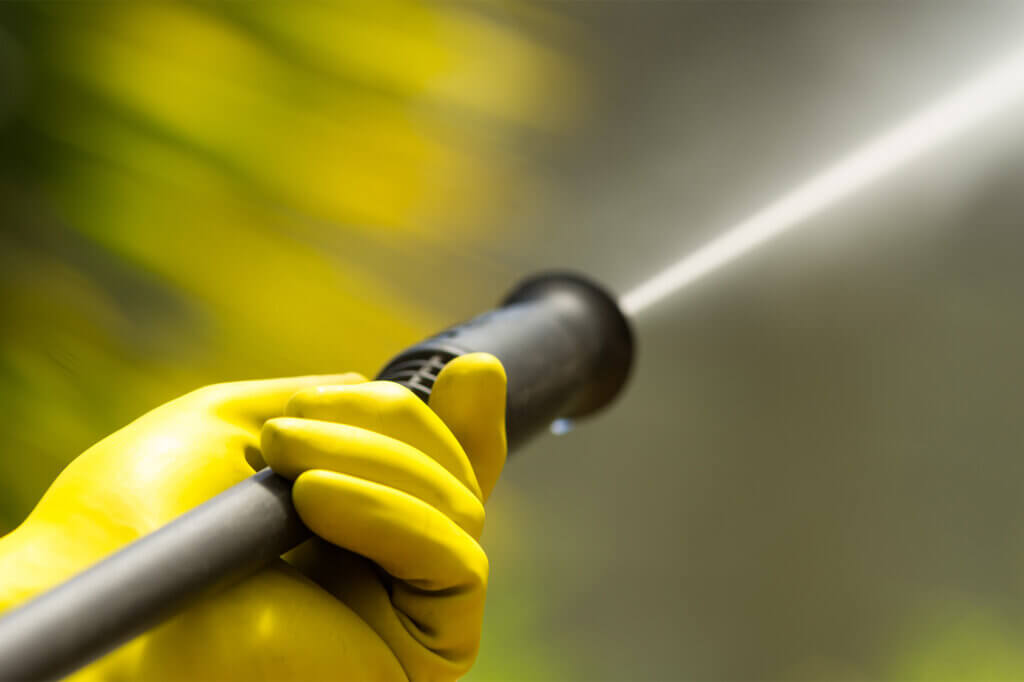
Mobile pressure washers tend to have lower flow rates, between 0.4 and 1.3 GPM. There’s a good practical reason for this: mobile pressure washers draw their water from a tank or bucket. This can’t be too large, otherwise you won’t be able to lift it. If the flow rate was any higher, the tank would empty too quickly.
Water temperature
Standard pressure washers don’t heat water. However, they can be connected to a hot water tap. This water is usually around 140 °F. If the water is any hotter, it can damage the pressure washer. Always check your manual to see what the maximum temperature your device can handle is.
Only use a hot water pressure washer if you have a specific need for it. High pressure boiling water isn’t usually necessary for most cleaning tasks. These devices are specifically designed for destroying germs and cleaning stubborn dirt quickly. For most people, they are too powerful.
Power supply
For electric pressure washers, you need to think about power supply. In most cases, you’ll either need a battery-powered model, or you’ll need an extension cord to plug the power cable in.
Detergent
Most of the time, there’s no need to use any detergent with your pressure washer. However, for certain tasks such as cleaning your vehicle, you might want to use a cleaning agent. Some models have integrated detergent tanks, or have a connection where you can screw one in.
Weight and size
Most pressure washers are pretty bulky and heavy, as they need to be strong to handle the high pressure. The motors also tend to weight quite a lot. The smallest models are similar in size and weight to normal vacuum cleaners, but it’s also common for pressure washers to weigh 30 pounds or more. These heavier devices always come on wheels for easier manoeuvrability on flat surfaces. If you’re planning on moving your pressure washer around or transporting it in your car, make sure to go for a lighter model.
Accessories
Make sure everything you need to use your pressure washer straight out of the box is included upon purchase. This should include a high pressure hose, a lance, and at least one attachment. It’s a good idea to go for a model with a flat jet and a rotating nozzle in addition to the standard one. If you go for a battery-powered model, make sure there are batteries included.
Repair and spare parts
Cheap electrical appliances from unknown brands are designed to be disposable. Often, the manufacturer won’t even offer replacement parts. This usually isn’t the case with branded devices, as the manufacturers rely on their reputation for durability and quality. A lot of these manufacturers offer warranty, or will repair your machine at a fixed price.
Accessories
Most pressure washers come with a few nozzle attachments included in the box. However, there are a few specific nozzles you might need, depending on the task at hand. For example, you can get special nozzles for unblocking drainpipes or gutters. Read on for an overview of pressure washer nozzle types.
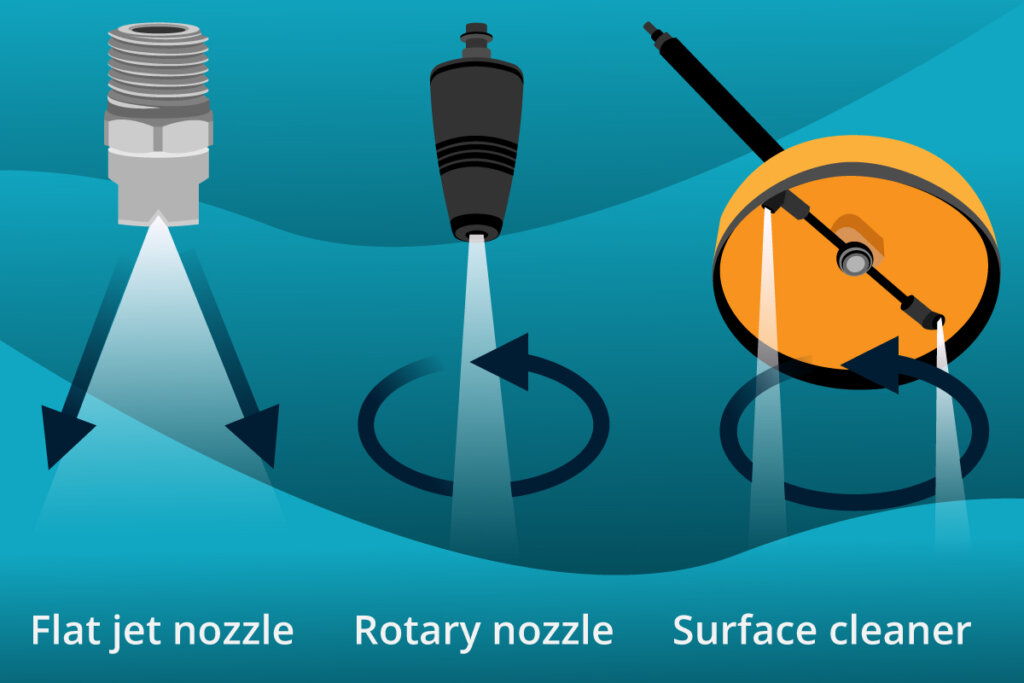
Flat jet
Flat jet nozzles are reliable workhorses. They fan the water jet out to help you clean faster. Flat jet nozzles are a good option for a wide range of tasks, from vehicles to fences. They usually come included with all pressure washers.
Dirt cutter
Dirt cutters are great for particularly stubborn dirt, like engine oil or lichen-covered walls. The nozzle produces a small jet of water, which means all the power from the pressure washer is concentrated on one area. In addition, dirt cutter nozzles rotate, meaning they have a chiselling effect which increases their power.
Surface cleaner
Surface cleaners are designed for cleaning large surfaces. They are similar to flat jets, except they are surrounded by a housing that prevents water from spraying to the side and upwards. This makes them more accurate.
Brush
At first glance, a brush might seem like a strange attachment for a pressure washer. However, a brush attachment means you can use the water jet to rinse away any dirt you scrub off. They are great for washing cars, but only if the brush is soft to avoid any scratches. You can get rotating as well as fixed position brushes.
Pipe cleaning
Blocked drainpipes are extremely frustrating to clean. Anyone who has tried unclogging one with a simple plunger can tell you a thing or two about it. Pressure washers with pipe cleaning attachments are much easier, and often cheaper than hiring a plumber. This attachment propels a hose into the pipe with rear facing nozzles, whilst simultaneously flushing the pipe out with a front facing jet.
Gutter cleaning
This attachment has a lance which is bent at a right angle, so you can clean a gutter without having to stand over it. You can also get extendable lances which reach up to 18 feet. Since you don’t need a ladder, cleaning your gutter is a lot safer.
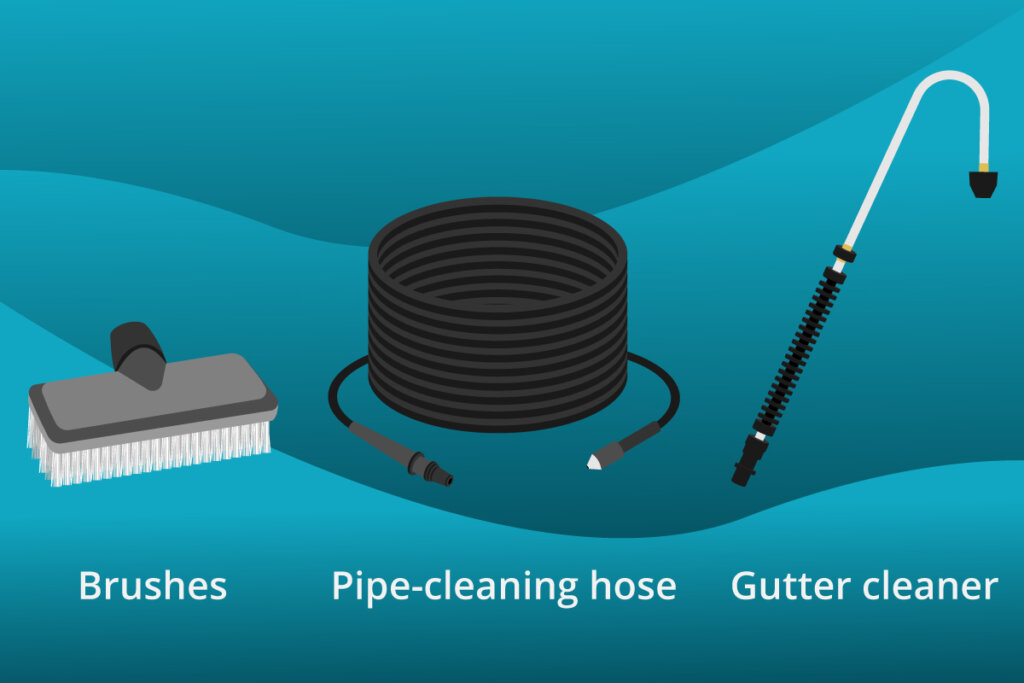
Hose extension
A longer hose means you can move around more when using your pressure washer. Standard hoses are usually between 10 and 15 feet long, but you can get extended ones that measure up to 100 feet.
Safety tips
Pressure washers are easy to use, but there are a few things to watch out for to avoid any accidents.
What are pressure washers not suitable for?
You can do a lot of things with a pressure washer, but there are some things you should definitely avoid. Don’t ever use them on humans, pets, or plants. You should also be careful with senstive surfaces and softer objects such as rubber seals and car tires. If you need to clean them, only use low pressure water. Don’t ever clean electrical appliances with a pressure washer, even ones that are waterproof. The pressure is often too high, and will break the waterproof seals.
Washing a car with a pressure washer
Pressure washers are a great option for cleaning your car, but only when used properly. If you use too high a psi, you can damage your paintwork by causing micro cracks. These will eventually cause the paint to peel. You can also damage window seals, tires, and any other soft rubber parts. Make sure to keep an appropriate distance from your car when pressure washing it. If your model allows you to adjust the psi, only use half pressure on your car. Flat jet nozzles are great for washing cars.
When pressure washing your car, the grains of sand and rock in the dirt can cause scratches on the paintwork. Before using your pressure washer, hose off the dirt to reduce the chance of this happening.
Cleaning a bike
Using a pressure washer to clean a bike is a contentious issue among cyclist. They are much faster than using a rag and bucket, but some people consider them too powerful, especially for the delicate components. If you pressure wash your bike, only do the frame, and like with a car, use half pressure.
Do you need detergent
As a general rule, you don’t need to use any cleaning agents with your pressure washer. This is good as it is more eco-friendly, but some tasks do need detergent. You can get special chemicals for cleaning wood, mossy stone, and plastic. If you can manage without them, do so as you won’t be polluting the earth and you will also save money. One exception is cleaning your car. You can get special chemicals that will leave your vehicle looking dealership shiny.
Dangers
The following accidents are common when using a pressure washer:
- Injury from water jet
- Loose or broken parts flying off
- Broken pipes
- Asbestos, lead, silicon dust, or other poisonous substances in the spray mist
- Loss of control from the recoil
- Hearing damage
Protective equipment
It is important to use the right kind of protective equipment when using your pressure washer. Alongside the right kind of clothing that covers your arms and legs, you should also get protective goggles. If your pressure washer is extremely loud, consider getting earplugs too.
Asbestos
Never use a pressure washer on materials that contain asbestos. The fibers in asbestos are carcinogenic. Using a pressure washer on asbestos can cause these fibers to become airborne and enter your lungs, causing cancer.
Image 1: © FinalCheck | Image 2: © PiyawatNandeenoparit / stock.adobe.com | Image 3: © Fotos 593 / stock.adobe.com | Image 4-5: © FinalCheck

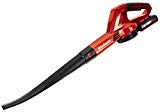
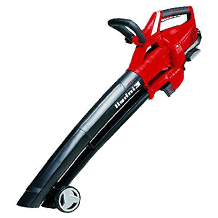
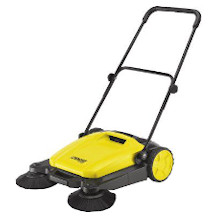
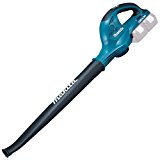
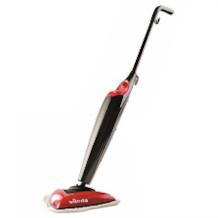
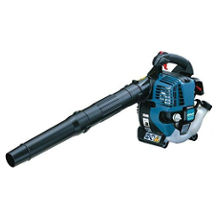
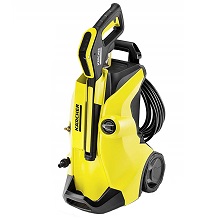
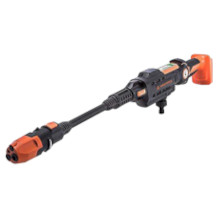
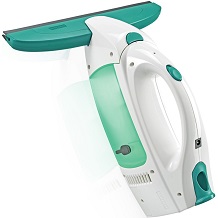











 5,134 reviews
5,134 reviews


